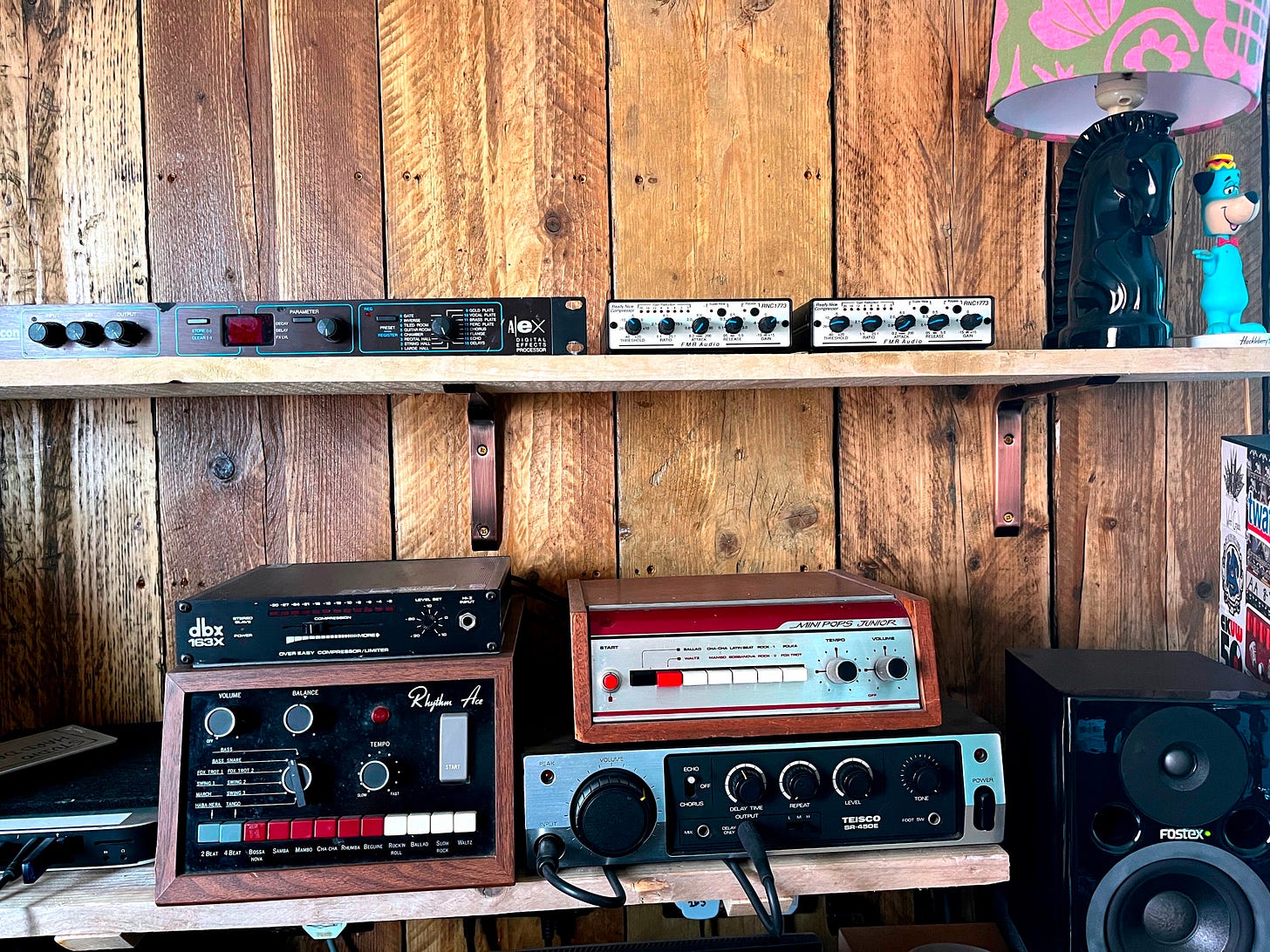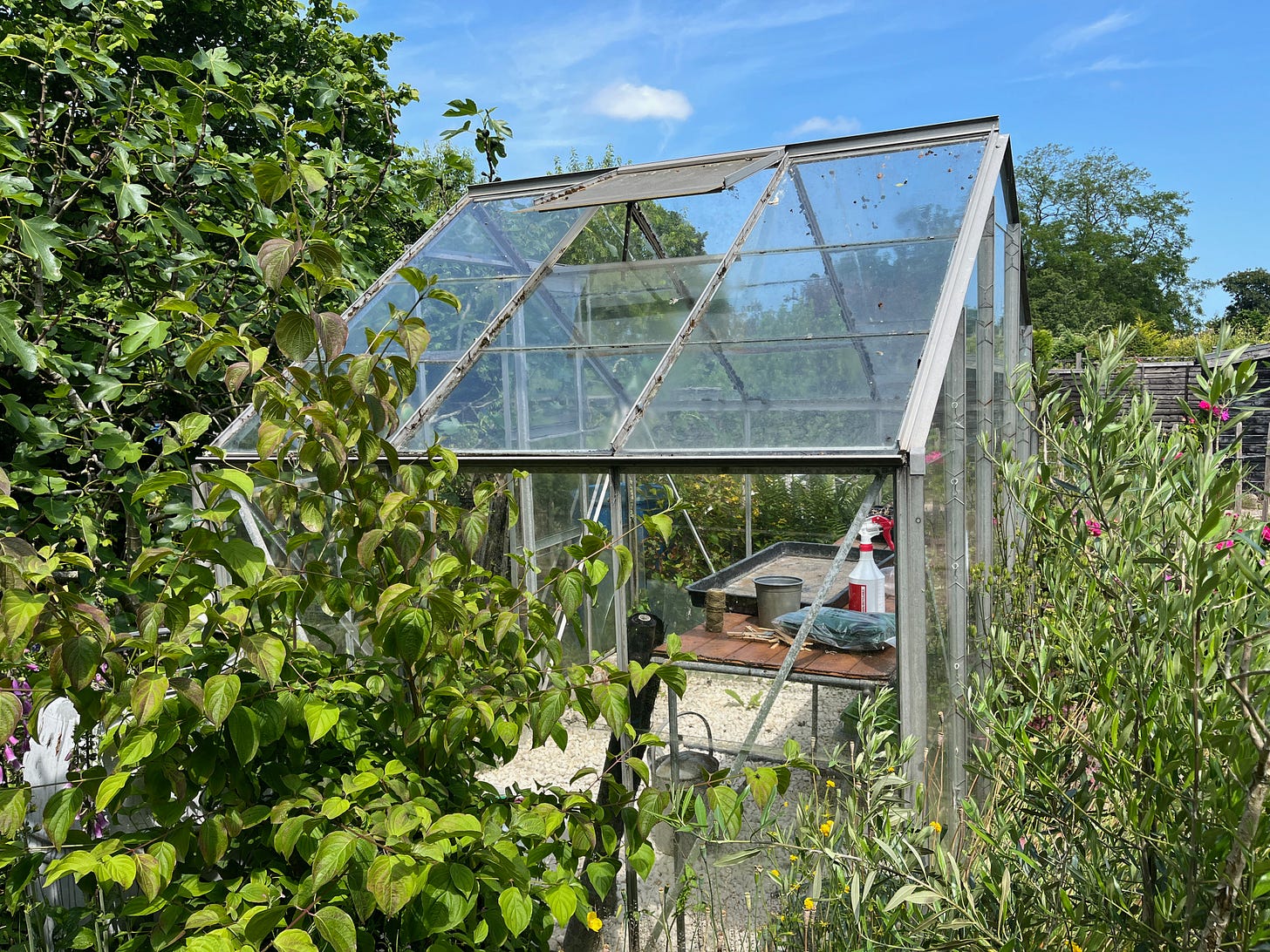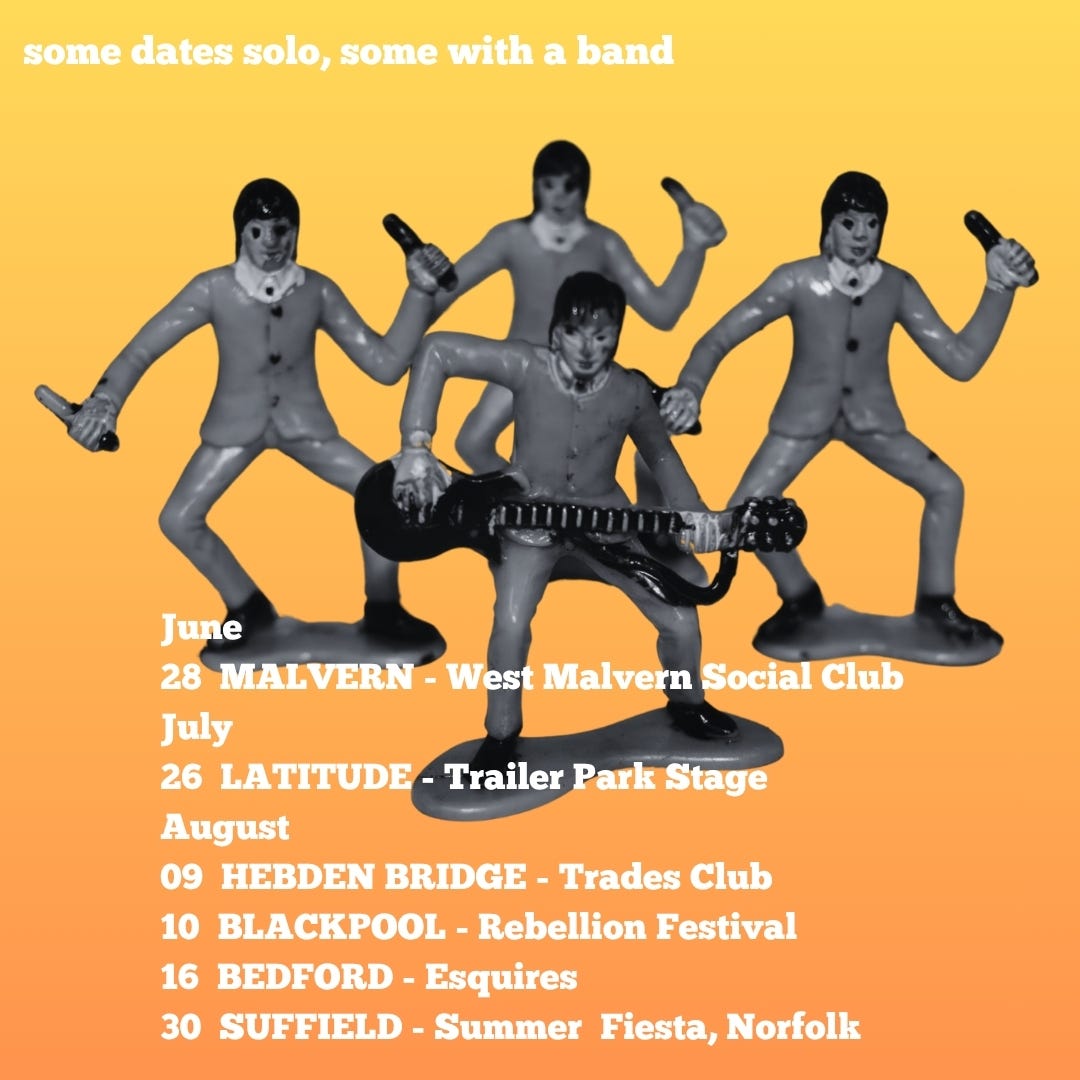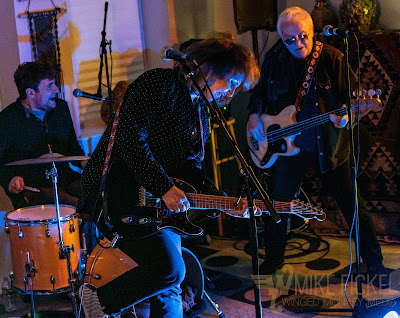I was worried. I spent most of the previous day getting ready and feeling vaguely resentful because I’ve got better things to do with my life than take on the US immigration authorities only to wind up shackled and in a detention centre waiting to be deported from a country I was none too fussed about coming to in the first place.
I didn’t sleep well - spent half the night on the sofa reading Mike Campbell’s autobiography - that’s Mike Campbell of Tom Petty & The Heartbreakers. I couldn’t put it down. I particularly liked the part about recording Full Moon Fever, just Mike, Tom and Jeff Lynne in Mike’s garage. A lot like me making one of my records except that theirs sold three million. My sales, if I’m lucky, are more like half that, and with three zeros knocked off.
I sailed through immigration. The young border guard looked bored, resigned, checked-out. He showed no interest in my British passport and barely looked at my green card. No fingerprint or retina scan. ‘Enjoy your time in America’ was all he said, and I fancied I heard a hint of irony in his voice. We picked up the guitars and suitcases, wheeled our way through the customs hall and airport arrivals, and out into the great wide open.
The cop pulled us over just as we were reaching our hotel. Seems we’d driven from Sloatsburg, where the New Jersey shopping mall sprawl mutates into I-87, all the way to Kingston, New York, in a large, black rental vehicle with no lights. While Amy was driving I was trying to turn up the heating - - it was bloody cold in upstate New York. I had to use the flashlight on my phone. These modern vehicles, they think of everything - beeps and flashes, and a weird pull on the steering wheel if you dare to veer out of your lane…but the heating controls don’t light up. You’d think they’d sort that out.
Even when we almost ploughed through a set of road works it didn’t occur to us that our vision was impaired by a lack of headlights.
The cop was nice about it. He ran Amy’s license and found it had been suspended. I said I could drive on my license. He said he’d have to run it. He came back and told us mine was suspended too. He printed out some paperwork and wished us a safe onward journey.
We got rid of our cars when we left but we forgot to return the license plates to the DMV so they suspended our driver’s licenses. Obviously we’re unfit to drive. Considering the headlights fiasco I think they might have a point.
I’ve got jet lag. Amy’s got some sort of problem with her arm that’s been going on for weeks and isn’t getting better. We feel old and clapped out.
We arrived on Sunday night, stayed in a hotel in a massive, and largely redundant shopping mall in Kingston. We were up very early on Monday morning due to the jet lag. America looks shabby and dilapidated. And it’s so fucking cold. No green on the trees up here. Constant drabness.
We drove up to Hudson to get our equipment out of the storage space. On the way I noticed a marked drop in the number of flags. The Trump flags and banners are all gone and I counted only four US flags between Kingston and Hudson. When I was last here, just before the election, every dowdy, rundown homestead seemed to be proudly waving Old Glory. A lot of people must be feeling badly let down right now.
We have to be thankful for what we’ve got. If we’re lucky enough to have anything.
Though I don’t think anyone on this planet should feel obliged to be thankful for living a peaceful and fulfilled life. It should be everyone’s inestimable right.
We have a dear friend, an US National who grew up in England and still lives there. When we left France to live in the States back in 2011 he said: ‘America has always been a fascist country, they just don’t want you to know it.’
That pronouncement has always haunted me though I always hoped was a far-fetched idea. Today it’s obvious that it isn’t.
We spent the morning rounding up equipment in our storage space in Hudson, picking up mail from the UPS store, and photo copying documents for the DMV in order to get our driver’s licenses reinstated. By early afternoon life was beginning to feel throughly pointless.
We met up with Sam Shepherd, our wonderful drummer and former Catskill neighbour, set ourselves up in the Avalon and started running through the set. Amy and I had run through everything at home, a couple of amps in the kitchen, cups of tea, very casual. Mostly so I could try to remember how the tunes went and what I played. As usual, we meant to do comprehensive daily rehearsals for at least a week before we set off, but as usual there wasn’t time.
We sketched everything out as best we could and joked how muscle memory would kick in. Amy was always a great believer in the power of muscle memory, but her confidence was shaken one night a few years back when we played my song Joe Meek together for the first time in years:
‘Are you sure?’ I said, ‘the middle eight’s a bit complicated.’
‘Shouldn’t be a problem’ she replied, ‘muscle memory’ll kick in.’
She stared at me like a deer in headlights as I negotiated the musical miasma of the middle part on my own. Unusual for Amy - it’s usually me who blunders through a tricky bridge hoping to accidentally hit a right note.
There was plenty of that on the first night at the Old Schoolhouse in Metuchen, New Jersey. I don’t think anyone noticed. The trick with the bass is to keep it rumbling and look confident. Sometimes it helps to stay on the same note until the rest of the band comes back around to it and then it sounds quite deliberate.
I enjoyed the show - it was great to be onstage with Sam again. Barbara from Girls On Grass opened - she has a great new song called Sex Is Great So Fuck The System. All her songs are great, and her guitar playing is stellar. She joined us later for All I Want which was quite a thrill. She’s left-handed so we we able to sing the backing vocals into one microphone with the guitar and bass facing each other, just like Paul and George - in my deluded mind at least.
The following day we drove to Pittsburgh which was wet and miserable. Get Hip Records is an enormous warehouse building,. There’s a smart bit at the front which has a look of chaotic organization, and behind that a labyrinth of redundant record collections and dusty hi-fi equipment. Somewhere in the middle is a room they use for concerts. The owner, Gregg Kostolich, told me this room has the exact same dimensions as the Chess Records studio in Chicago. They intended to install a studio in there, but a whacking great transformer on the roof was causing interference in the recording equipment so they turned it into a venue instead.
There was way too much PA and no one to do the sound so I did it, which was strenuous because we were on a high stage and the mixing desk was at the other end of the room. I had to keep jumping off the stage to go and make adjustments. There we two monitor wedges at the front of the stage, each linked to a Peavey vocal PA cabinet on either side of the stage at the back. They were causing a lot of problems but the only way I could turn them off was to disconnect them but this also disconnected the front monitors. The cables appeared to have been built into the carpentry, and I didn’t have time to sort out a knot of electrical spaghetti, so I bypassed the Peaveys with the aid of a couple of guitar effect pedals. I don’t think anyone understood what I was doing. It’ll probably stay that way until someone notices that the Peaveys aren’t working, or someone misses their effect pedals.
I got us balanced up, marked the settings on the mixer, and told the various n’er-do-wells who were hanging around the DJ and beer supply not to touch anything.
I should get a Boy Scout badge for operating dodgy PA systems. We had something similar last time Amy played in Pittsburgh, at the Banfa Tea Rooms. I had to work with what there was - two plastic speaker cabinets and a very dusty six channel amplifier which was very possibly built from a kit sometime in the early seventies. I told Amy I’d done the best I could. She spoke into the microphone. ‘There’s no way I’m singing through that’ she said. But she did, and it sounded great in a charming and lo fi manner.
Lou and Conni Koury’s house concert has to be the best small venue in Philadelphia. I’ve played there three times with Amy and once on my own. They have a vocal PA made by Fender. We were the first band to ever use it. I can set it up in minutes. There was a knock at the door after the soundcheck. I opened the door as I was closest and there was our friend Mike Fickel. He flown in from Texas specially for the show it was a wonderful surprise. He stayed the night and set off back to the airport at some ungodly hour, like nine o’clock in the morning.
That's one of Mike's photo at the top of the page. I've used it entirely without permission. Thanks Mike!
We set off for the final show - a triumphant return to the Spotty Dog in Hudson. We got there early and had our first sitting at a table dining experience of the tour. Dinners and playing shows don’t always go hand in hand. There isn’t time, you don’t know where to go, or the promoter has very kindly made some soup - delicious, but it isn’t dinner. We often end up feeling hungry after the show, and sometimes I’ve even been known to endure the hotel breakfast the following morning.
We were constantly revising our stance regarding soup. We were pro-soup at the Franklin Schoolhouse, but after the show, on the way to the hotel, we resumed our rallying cry: SOUP IS NOT A MEAL! In Pittsburgh, faced with a revolting Thai curry which arrived ten minutes before we were due to play (and cost a small fortune) we were ardently pro-soup again. We were definitely pro-soup at Lou and Conni’s - theirs came with gnocchi and all kinds of extras. I think the official line now is that we’re pro-soup with conditions. A non-fulfilling soup experience could easily change this.
The Spotty Dog is a tough gig. You have to wait until the bar staff push the book shelves together to the back of the room, and then you’ve got about half an hour to set upp. We use our own PA in there - it’s the old Spotty Dog PA - I bought it off them when they put in a new system which doesn’t really work so well for bands.
Sam was shocked by the lack of space - I kept telling him to move his kit closer to the bass amp or there wouldn’t be room for Amy. He was also a bit surprised by the lack of a soundcheck. The place was already packed. Running through a couple of tunes isn’t a good look in that situation. You set up in semi-darkness and hope for the best. Fortunately we’ve played there so often I pretty much know the settings that are going to work. I checked the vocal mics, the level of Amy’s acoustic guitar, we made sure the amplifiers were working and that was it. We went upstairs and hid out until it was time to play.
I’ve never seen the Spotty Dog so crowded - people were spilling out of the door and onto the street. Amy worked there for twelve years - their longest serving employee. It was an important part of her life. She sometimes has nightmares that they’ve moved the bar or changed the place into a takeaway. A year after her last shift she still has to fight the urge to correctly organize the books or help out behind the bar. She was relieved to find everything just as she’d left it - she was doubtful that they’d even swept the floor…
We played well- I think we always do, or at the very least we maintain a standard. But four shows in is often about as good as it gets - you’re in the swing of it but there’s no room for complacency, it’s still all on the edge. It was a real pleasure playing with Sam again - every hit’s a good one, loud, purposeful, but never bombastic, a real team player, quietly neurotic and great fun to hang out with. Amy was on fire - a cliché I know, but how do you say these things? She’s notched up her delivery by a couple of levels. She always had the moves but now she backs it up with the guitar playing. She’s become quite a guitar slinger. Of course I attribute this this in part to the Vox distortion pedal I got her - she used to borrow my spare Guyatone Zoom Box but I thought it was time she had her own. The Vox pedal is actually a Guyatone Zoom Box in a snazzy V shaped casing finished in subtle tones of blue and grey. I’m jealous beyond belief!

Amy went to California to do some solo shows and spend time with her daughter, and my stepdaughter, Hazel. I went home and carried on working on the new album I have planned for release later this year. This one’s a bit of an oddity, something I got started with Sam while we were preparing to sell the house in Catskill. He’d come around in the late afternoon and I’d answer the door covered in paint or plaster. ‘I hate my life’ I’d say, and then we record another backing track, just drums and a guitar. I started to dismantle the studio literally moments after we finished recording the basics of the final track.
And here I am, undismantled - if such a word or condition exists. I’ve been working very hard on this - there’s a deadline. Sometimes the work seems insurmountable. I’ve just found out I’ve got more time than I thought because the short UK tour I was about to do opening for the Fixx which was supposed to start next week, has been quite unceremoniously cancelled due apparently to unforeseen circumstances. At this stage I don’t know anything more. They’re making an announcement tomorrow. I’m a bit pissed off for myself personally because I’ve already booked and paid for my hotels. I could also do with the income. But I’m glad about the extra time it affords me to work on the album.
It’s good in these terrible times to have something to do. The one positive thing I noticed in America is that decent Americans seem to be even kinder and more caring towards each other than ever before. I’ll hold on to that for now.
I’m doing a few shows this summer with a band - my friend Graham Beck on keyboards and keyboard bass, Amy on electric and acoustic guitars and percussion, and Will Moore on drums. I haven’t done anything with a band since about 2015.
Bands often frustrated me - I often found playing live with a collection of other musicians could be a limiting for me, but I love all the playing Amy and I have done together. I’ve known Graham since 1973 - we met at art college in Hull and played together in bands and on and off since then. I've always enjoyed playing and hanging out with Graham. Amy says he’s a natural choice for me - she says we’ve got chemistry. It’s going to be a beautiful freeform racket with songs. I’m excited about it - I’m going to include my tour dates so that the five or so people who read my blog all the way to the end can also get excited:
JUNE
28 MALVERN West Malvern Social Club (solo show) ticket link
JULY
26 LATITUDE FESTIVAL Trailer Park Stage
AUGUST
10 BLACKPOOL Rebellion Festival, Blackpool Opera House
16 BEDFORD Esquires ticket link
30 SUFFIELD SUMMER FIESTA Suffield, North Norfolk
SEPTEMBER
11-14 KUFSTEIN, AUSTRIA Sprachslaz Festival (solo appearance)








